Kris Spisak's Blog, page 27
May 11, 2017
Writing Tip 219: “Internment” vs. “Interment” vs. “Internship”


This is what this poor interned cheetah thinks of your typos.
Some typos—like turning “emulate” into “immolate”—take a dark turn, but then you have other typos that are dark no matter what way you look at them. “Internment” vs. “interment” is one such example.
Remember:
“Internment” is imprisonment or a confinement of some kind, a word often used in reference to wartime camps.
“Interment” refers to the act of burial, the placing of a body into its final resting place.
Then you have “internship,” which is admittedly similar, but not a word that you would ever want to confuse with either of the above on an application.
An “internship,” of course, is a short-term professional position one might apply for to gain experience in a specific trade or industry.
The pronunciation of the word “intern” is also worth a note. If you stress the first syllable (IN-tern), we’re talking about a professional experience. If you stress the second syllable (in-TERN), we’re talking about being locked away. Yes, this is complicated in itself, but for the love of life, please don’t confuse either of these meanings with “inter,” the verb referring to the placing of the deceased in a cemetery, crypt, or tomb.
Whatever internship horror stories you’ve heard, I’m sure they are nothing compared to what can happen with one of these typos. Yikes!
Join 550+ subscribers and sign-up for my writing and editing email newsletter for more tips like this.
The post Writing Tip 219: “Internment” vs. “Interment” vs. “Internship” appeared first on Kris Spisak.
May 9, 2017
Trivia: Curfew
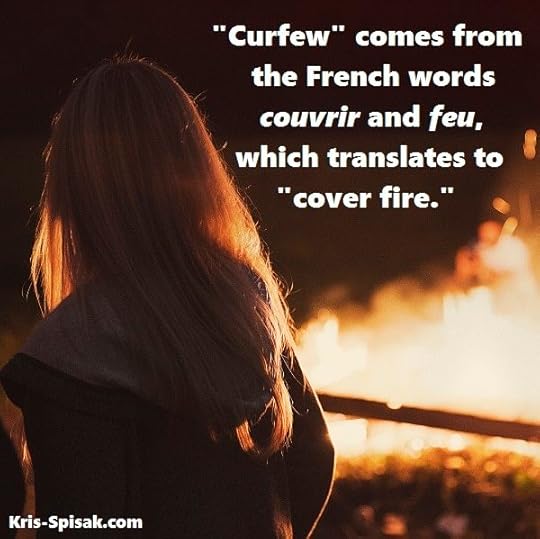

Join 500+ subscribers and sign-up for my monthly email newsletter for more trivia like this.
The post Trivia: Curfew appeared first on Kris Spisak.
May 4, 2017
Writing Tip 218: “Buck Naked” vs. “Butt Naked”


Some might call him majestic. I’m calling him a little bit annoyed about this typo.
I’m just saying, folks, there are a lot of butts where they shouldn’t be. And I’m not talking about politics or seating arrangements.
Just like “nip it in the bud,” the expression “buck naked” is often misspoken and mistyped with a reference to the buttocks that simply isn’t there.
But—with one “t”—to be completely clear, there should be no references to a tush, fanny, derriere, rump, backside, or badonkadonk in either of these phrases.
To be “buck naked” is to be completely naked. If you were only “butt naked,” maybe you’d just be without pants. I could take this way further, but I’m going to stop here. You’re welcome.
The popularity of “butt naked” seems to be growing, especially on the web, but just because you see it all over the place doesn’t mean that it’s the truth. Oops, I stumbled into politics again.
In conclusion, you know I have to note that this isn’t an expression that you should use in any formal correspondence, but whenever you do happen to use it, please take the time to get “buck naked” right.
Join 500+ subscribers and sign-up for my writing and editing email newsletter for more tips like this
The post Writing Tip 218: “Buck Naked” vs. “Butt Naked” appeared first on Kris Spisak.
May 2, 2017
Trivia: “Pamphlet” Etymology
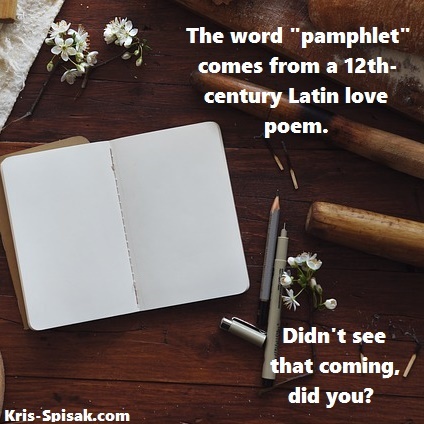

The poem’s name was “Pamphilus, seu de Amore,” and it was apparently passed around so much that a thin collection of folded papers soon became synonymous with the poem itself.
Join 500+ subscribers and sign-up for my monthly email newsletter for more trivia like this.
The post Trivia: “Pamphlet” Etymology appeared first on Kris Spisak.
April 29, 2017
Authors on Editing: Interview with Lila Quintero Weaver
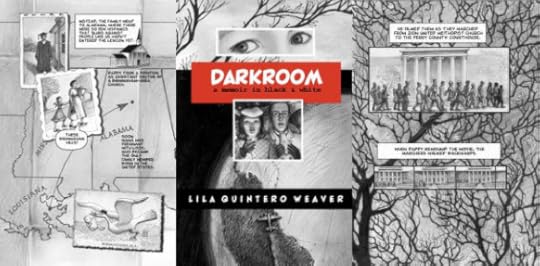
Before an artist tackles a project, often there is the vision of what it will become. Whether it will be a novel, a symphony, or a masterpiece on canvas depends purely on one’s creative inclination.
I have such an admiration for the work of Lila Quintero Weaver, who joins me for today’s interview, not only because of her talent as both an author and an illustrator, but also because of the complex subject matter she tackles. Her vision spans multiple mediums, and the end result is thought-provoking.

Lila Quintero Weaver is the author-illustrator of Darkroom: A Memoir in Black and White (The University of Alabama Press, 2012), and a children’s novel, to be published in 2018 by Candlewick Press. Publisher’s Weekly called Darkroom, “a vivid, insightful, and moving graphic memoir.” Graphic Novel Reporter wrote: “Stunning, not only for its beautifully rendered imagery but also for its heartfelt story.” The Spanish edition of Darkroom is also coming soon.
Q & A with Author and Illustrator Lila Quintero Weaver
Kris: Because you’re working with both the text and the illustrations, what does your editing process look like?
Lila: Writing and illustrating Darkroom involved a constant gauging of the play between words and images. For the text, I developed a few tricks, such as reading sections aloud to myself, watching for such things as clumsy wording and bumpy transitions. Although I worked closely with my editor, I didn’t have an art director, and doing the illustrations and page layouts called for lots of honest self-assessment.
Kris: What is the most critical part of the editing process for you?
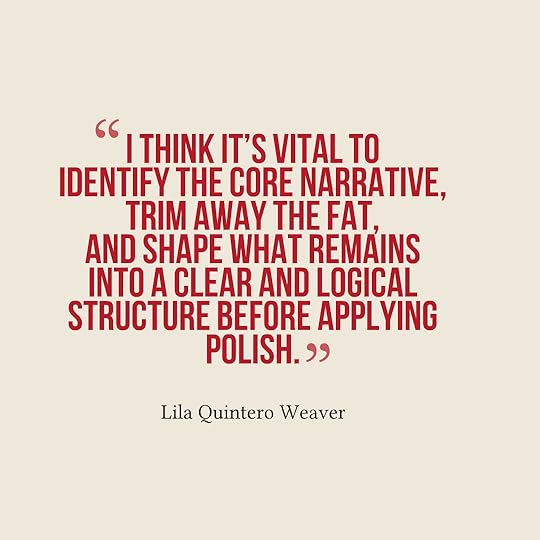 Lila: Pardon my vernacular, but the old saw that you “shouldn’t polish a turd” is a wise directive. The temptation is to skip straight to the fun stuff—making sentences pretty. I think it’s vital to identify the core narrative, trim away the fat, and shape what remains into a clear and logical structure before applying polish.
Lila: Pardon my vernacular, but the old saw that you “shouldn’t polish a turd” is a wise directive. The temptation is to skip straight to the fun stuff—making sentences pretty. I think it’s vital to identify the core narrative, trim away the fat, and shape what remains into a clear and logical structure before applying polish.
Kris: Is time away from your project a necessary part of the process?
Lila: Yes, time away works wonders. For whatever reason, our brains adapt to what is on the page and will not readily pinpoint issues without taking a break. Neuroscience must have an explanation for this.
Long before trying my hand at writing, I painted portraits. Whenever I found myself struggling to capture a subject’s likeness, I’d leave my studio, close the door, and busy myself with other things, letting a full day pass without looking at the portrait. Amazingly, my first return glimpse would tell me everything I needed to know, and I could immediately correct the problem. The same trick works for writers, although—to be honest—the turnaround is nowhere near as quick for me, as I’m still learning to see what constitutes good writing.
Kris: I love that advice. Walking away can make such a dramatic difference. I find this is especially true with big picture issues—and speaking of the big picture, in Darkroom, where you’re exploring connections between immigration and race, how did keeping in mind this theme influence your final edits?
Lila: Once I had laid the story out on the page, I stepped back and tried to imagine how a reader would perceive the organic whole. Did it offer clarity, heart, flow, and solid execution? I relied on literary instinct for the answers, but also on the editing team and my beta readers. I made some last-minute content changes based on their feedback.
Kris: Your forthcoming book has a different audience from Darkroom. How does writing for younger readers influence your approach, and how do you double-check that you’ve gotten it right in your late stages?
Lila: Yes, Darkroom is not aimed at younger audiences, although kids as young as 11 have told me they enjoyed it. My follow-up project is a middle-grade children’s novel, and writing it has taught me a great deal about adjusting for kid readers. The key was establishing the right voice for my narrator. Somehow, finding her voice helped me access the 12-year-old mentality that still lives deep inside my brain cells. Of course, voice doesn’t excuse lax writing. You still have to deal with the rules of grammar and punctuation. Since my narrator speaks in a regional dialect, replete with colorful idioms and slang, the question became: when is it permissible to dispense with those rules? Between the copyeditor and the manuscript editor, we had a good many such decisions to make.
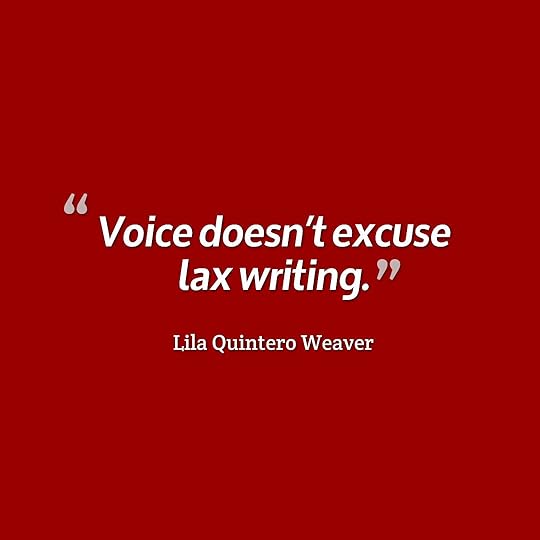 Kris: Outside of the choices you make for your characters, are there any word usage or punctuation issues that still slip into your early drafts from time to time?
Kris: Outside of the choices you make for your characters, are there any word usage or punctuation issues that still slip into your early drafts from time to time?
Lila: I’m a relentless proofreader of my own work and strive to hand in clean copy, but comma placement often gets the best of me. I’m also confused by certain capitalization rules. One example of this is the difference between titles and positions. So you get “Abraham Lincoln, President of the United States,” but you also have “the president of the United States at that time was Abraham Lincoln.” In my writing, I often deal with instances of specific vs. generic references. These are covered by the rules of capitalization, but sometimes it’s not easy to parse how they should be applied.
Kris: That’s such a true answer. Capitalization rules do feel more complex than they should be sometimes. Last question for you: is there anything about the revision process that you wish you had known sooner?
Lila: Before I became interested in writing, I had no idea that there would be so much building up and tearing down involved. You hear writers refer to “murdering their darlings.” Here’s the metaphor that speaks to me: Writing is like turning a scrawny bush into a shapely topiary. In the early stages of revision, you may need to lop off entire branches, and this can be painful. But by the time you reach the stage of snipping leaves, the end product is in sight and you’ve almost forgotten how hard it was to say goodbye to the deleted material. It helps to keep the goal of revision in mind. We’re trying to give readers a seamless experience. We want branches and leaves to come together in such a full and pleasing shape that nobody suspects how scrawny or unwieldy our first draft was.
Isn’t that final metaphor lovely? I can just see the untamed mess of an early project—snarled and full of brambles, overgrown, buggy, Gaia’s worst bed head. Yet when we take the time to tame it, tend to it, and sculpt it, it becomes a work of art.
Of course, I only edit in one artistic medium. For those of you working in more, I am impressed and amazed by you.
Thank you so much for your time, Lila Quintero Weaver, and happy writing everyone!
Join 500+ subscribers and sign-up for my monthly email newsletter for more interviews like this.
The post Authors on Editing: Interview with Lila Quintero Weaver appeared first on Kris Spisak.
April 27, 2017
Writing Tip 217: “Embed” vs. “Imbed”

 When you’re looking for a black and white, right versus wrong answer, please don’t make the question be anything about the usage of “embed” vs. “imbed.”
When you’re looking for a black and white, right versus wrong answer, please don’t make the question be anything about the usage of “embed” vs. “imbed.”
Are fossils embedded in stone or imbedded in stone? Is the video of Grammartopia-RVA embedded on my website or imbedded in my website? Is a journalist embedded with soldiers or imbedded with soldiers?
The answer might not be one you like: both are correct.
Admittedly, “embed” is the more common spelling in the present day, but “imbed” still is considered an acceptable word.
There’s no definition change, just a change of the first letter—for fun. Okay, maybe not just for fun. Maybe it actually has to do with spelling changes across cultures and time.
If you really wanted to dig into it—fossil pun not intended—it’s been a popularity contest that’s flip-flopped a lot over time. According to the Google Books Ngram Viewer, “imbed” was the favored word for centuries until “embed” took over in the early 1910s, only to fall in esteem again for another decade, before gaining the secure favorability in the 1920s. And since the 1920s, “embed” has been the preferred word.
If it makes it easier, I’m one to use “embed” or “embedded” every single time, since this is the more common form and the spelling that seems to be more acceptable across the technology industry—but just like these fossils, only time will tell which form endures.
Join 500+ subscribers and sign-up for my writing and editing email newsletter for more tips like this
The post Writing Tip 217: “Embed” vs. “Imbed” appeared first on Kris Spisak.
April 22, 2017
Authors on Editing: Interview with Harry Heckel
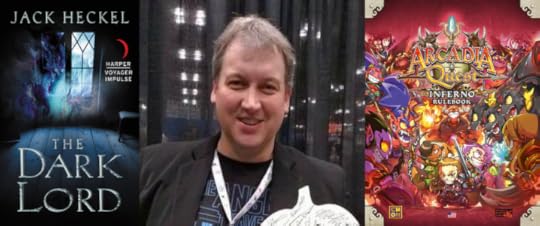
When we think of professional writers, perhaps we think of authors or journalists. Screenwriters, playwrights, and poets might come to mind—maybe even copywriters or bloggers. However, among the topics of today’s interview is writing that is at once unexpected and right under our noses: the text of games.
As a fantasy novelist, a co-author, and a game writer, Harry Heckel is not only a busy man, but he is a man of many talents. No matter what you write, the advice he shares in the following interview is worth a read if you want to up your game—literally or figuratively.
Harry Heckel started by writing pen and paper roleplaying games, notably for White Wolf Game Studio, before moving into novels. As Lee Lightner, he co-authored two Space Wolf novels set in the Warhammer 40K universe. He is currently half of the writing team of Jack Heckel, and under that name has written The Charming Tales series from Harper Voyager Impulse. His latest novel from Harper is The Dark Lord, a parody of epic fantasy, stuffed with geek references. He is currently writing the next book in the series, The Darker Lord, and preparing for The Darkest Lord, both scheduled for release in 2018. He also has a few independent novels under his own name and does freelance work for roleplaying, board game, and miniature wargame companies. He lives in central Virginia with his wife, daughter, and two cats.
Q&A with Fantasy Author and Game Writer Harry Heckel
Kris: When you think of “editing” your work, what does this word mean to you?
Harry: Most of my time “writing” is actually editing. For me, editing encompasses everything after the words first appear on the page. It means reading through my draft and fixing story elements, polishing my prose and making sure my grammar is correct. Sometimes, it can include a major rewrite or three, and I often add as much as I cut. Once I’m at a point where I believe further changes have diminished returns and I’m fairly happy, I’ll send my work off to my editor who will invariably send it back with further edits. After those edits are made, there will be a final copyedit, and I’ll give the book a last read.
Kris: Walk me through your editing process step by step.
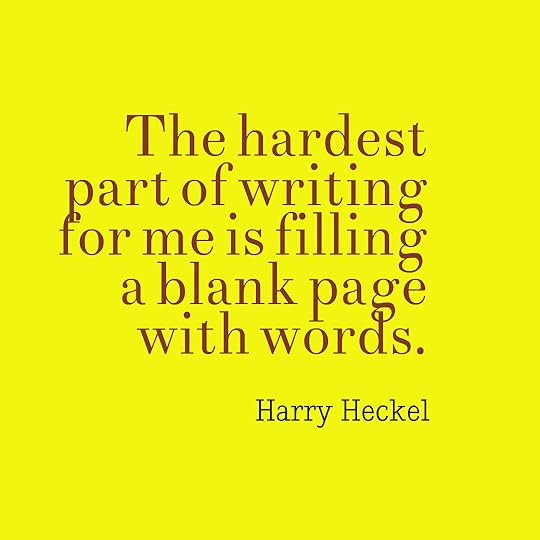 Harry: The hardest part of writing for me is filling a blank page with words. That’s always my first priority, so I try not to edit too much while I’m doing the first draft. I do my best to limit myself to a spelling and grammar check plus a read-through after the end of each chapter. However, my stories deviate from their outlines as I write—and usually that’s a good thing—but it means that I often have to go back to early chapters and add or subtract material. In my first round of edits following the completion of my draft, I concentrate on description and content rather than spelling or grammar. If the story isn’t right, I may need to cut an entire paragraph or maybe even a chapter, so I’d rather not worry about fixing the grammar in it first. Once I’ve been through the story and received feedback on it, and I’m convinced that everything is right, I’ll go through and clean up the grammar and spelling.
Harry: The hardest part of writing for me is filling a blank page with words. That’s always my first priority, so I try not to edit too much while I’m doing the first draft. I do my best to limit myself to a spelling and grammar check plus a read-through after the end of each chapter. However, my stories deviate from their outlines as I write—and usually that’s a good thing—but it means that I often have to go back to early chapters and add or subtract material. In my first round of edits following the completion of my draft, I concentrate on description and content rather than spelling or grammar. If the story isn’t right, I may need to cut an entire paragraph or maybe even a chapter, so I’d rather not worry about fixing the grammar in it first. Once I’ve been through the story and received feedback on it, and I’m convinced that everything is right, I’ll go through and clean up the grammar and spelling.
Kris: How does writing with a partner change your editing?
Harry: The trick to being a successful co-author is all in the editing. I worked with Jeff Smith as a co-author under the name Lee Lightner, and I’m currently working as a co-author with John Peck under the name Jack Heckel. When Jeff and I wrote together, we’d read each other’s chapters, and edit (or even rewrite) each other’s work to make sure that we kept the voices of the characters the same. John and I follow a similar pattern. In the case of The Charming Tales series, we both wrote certain chapters, and I would rewrite his chapters and he would rewrite mine, blending our writing styles and creating the voice of Jack Heckel. It worked out well for us. With The Dark Lord , we had to change things up due to real life, so I ended up doing the first pass for most of the book. John edited the chapters that I wrote, adding elements to them and changing them as he went, blending our voices once again. I went through a final pass behind John, editing what he had done, and we both did a final read-through and edit together.
The biggest difference in having a partner is the need to communicate the changes. For example, John called me earlier to talk about The Darker Lord and let me know that he had changed a professor in the novel to allow for a Time Bandits reference. He also asked about a reveal that he decided should happen earlier than our outline suggested. That communication is crucial, and he was ready for me to object and negotiate with him. Fortunately, I liked what he had done, but there are times when we have to spend time going back and forth before we reach an agreement. Grammar isn’t an area where we tend to disagree, as we are both horrible with commas, but we do have occasional conflicts in our writing styles. When that happens, we both try to accommodate the other person.
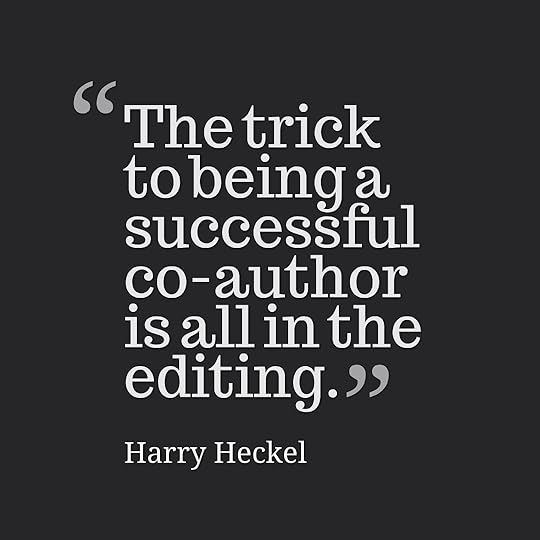 The great part of having a partner is when that person comes up with an idea that makes the novel better or takes one of your ideas and becomes inspired to create something spectacular. When John and I are in the right space, rewriting and editing becomes a world of fun.
The great part of having a partner is when that person comes up with an idea that makes the novel better or takes one of your ideas and becomes inspired to create something spectacular. When John and I are in the right space, rewriting and editing becomes a world of fun.
Kris: Is editing books different from editing text for games?
Harry: What a great question! I’ve never given it much thought. It can be.
When I’m writing a novel, I have a great deal of freedom with my fiction. I can change the world and write in whatever tone or style I want, as long as my co-author and editor are willing to put up with me. However, most game companies have a particular style or tone that they want in the game. They may even have samples of fiction and their own style guides that they want you to follow.
When I wrote for Star Wars, I had to be careful about my language, and I had a number of rules that I needed to follow, including at that time, not mentioning the Clone Wars, and not doing anything that might paint the Empire in a good light or the Rebel Alliance in a bad light. For Star Trek, the hardest part was continuity and not writing anything that would conflict with any of the TV shows, movies, or novels. They also had rules about their tone and how Star Fleet should be presented. My most recent board game projects, Arcadia Quest: Inferno and Arcadia Quest: Pets, needed a fun comedic tone with lots of injections of parody, and I certainly wasn’t about to write something serious.
Kris: Are there any additional editing considerations for role-playing games?
Harry: Beyond the style, tone, and continuity for any shared settings, the major consideration has to be the game rules. You don’t want to do anything that doesn’t make sense within the rules of the game. In Vampire: The Masquerade, nearly all vampires would burn in sunlight, so even with artistic license, I couldn’t have a vampire who went outside every day to work as a lifeguard. That’s an extreme example, but the rules of the game are the laws of physics for that universe. If you don’t obey them, your writing won’t make sense to the people who play the games.
Kris: That makes sense. Now, from novels to games and everything in between, what is your best tip for making the most out of settings in the final revision phase? I know this is a big part of your writing.
Harry: I’ll give two. First, use all of the senses in your descriptions. Make sure your characters hear and smell things instead of just seeing them. Have them touch and taste their environment. Second, read over your setting, and imagine you had to explain the world to a child. Why is Mysterium University at the center of the universe? How do all the dungeons have monsters? Where do wizards live? The better you can describe and explain your setting, the easier it will be for your reader to suspend disbelief and join your characters there.
Kris: Are there any clichés or over-used words that you always try to cut from your work if they accidentally sneak in?
Harry: Actually, there are really only a few, of course, that I started to have just come to mind…okay, I’m being silly. Words such as “actually,” “very,” “really,” “just,” “then,” “a lot,” almost anything with “–ly,” and the dread passive voice are the first things that come to mind. I think every author has words that they overuse, and I encourage everyone to work to identify them. “Just” is one of those words for me, so I’ll do a find for the word “just” and track down and evaluate every appearance of it in my text. I also run through “its” and “it’s” to make certain that I don’t use the wrong version.
Since I write comedic fantasy, clichés are my bread and butter, but what I try to do is make sure that I’m being respectful in my writing. I don’t want to put women in refrigerators or show disrespect for anyone’s culture. That’s not always easy when you are trying to do comedy, but words have an impact. I strongly recommend doing diligent research to make sure that your details are right in your book. I also recommend sensitivity readers if an author has any concerns.
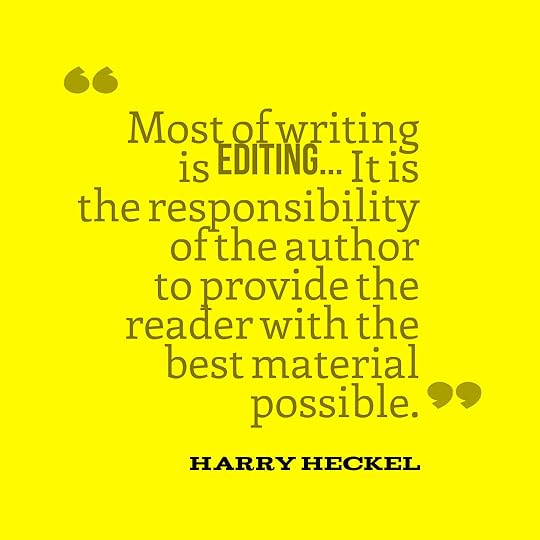 Kris: Words do have impact. I appreciate that note. I love it when authors not only realize this but take this idea to the next level with a thoughtful revision process.
Kris: Words do have impact. I appreciate that note. I love it when authors not only realize this but take this idea to the next level with a thoughtful revision process.
Last question for you: What do you wish that you knew earlier in your career about the importance of editing?
Harry: I wish I had known how important it was. I didn’t realize that most of writing is editing. So many books that are self-published or published through small presses have grammatical mistakes or story errors that could have been avoided with another round of edits. Even in my books from major publishers, there are still errors. I don’t think you can ever eliminate all of the problems, but I believe that it is the responsibility of the author to provide the reader with the best material possible. If you are willing to buy my book, I want to entertain you, not have you wonder how my protagonist saves the day with the pistol that she lost two chapters before or have to reread a paragraph because I didn’t use proper punctuation. I can’t emphasize how important it is to have good grammar and spelling. I’m so thankful for my editors over the years, and I hope each of them realizes that they have made me a better writer.
I don’t think Harry was just sweet-talking me at the end here. These are the subtleties that matter so much. We have to pay attention to our plot details and we have to carefully proof every line—whether the fate of the kingdom relies upon it or simply for the sake of clarity in our ideas.
Thank you so much, Harry Heckel, for taking the time to share your ideas, and happy writing, everyone!
Join 500+ subscribers and sign-up for my monthly email newsletter for more interviews like this.
The post Authors on Editing: Interview with Harry Heckel appeared first on Kris Spisak.
April 20, 2017
Writing Tip 216: “Jam” vs. “Jamb”

 Clearly, grammar is my jam. I just love it—and I’m going to argue the expression “That’s my jam” applies to more than just favorite music—so when I see words misused, I just have to stop and think, “did you really mean to write that?”
Clearly, grammar is my jam. I just love it—and I’m going to argue the expression “That’s my jam” applies to more than just favorite music—so when I see words misused, I just have to stop and think, “did you really mean to write that?”
For example, if I see the phrase “door jam,” my imagination concocts all sorts of nonsensical ideas from jelly squeezed out of doors to architectural traffic congestion to something right out of the Mad Hatter’s tea party.
However, I’m guessing none of these are what a writer intends to imply.
Remember:
A “Jamb” is a vertical piece that frames a door or window.
“Jam” as a noun is a delicious fruit-based spread, a difficult situation, a musical collaboration, an overcrowding or blockage, or a favorite song.
“Jam” as a verb is push into a tight position or to be stuck and somehow dysfunctional.
I know those silent “b”s can sometimes be a bit sticky… I mean tricky… but I have faith you can use your words correctly.
Because using our words well should be everyone’s jam, right?
Join 500+ subscribers and sign-up for my writing and editing email newsletter for more tips like this.
The post Writing Tip 216: “Jam” vs. “Jamb” appeared first on Kris Spisak.
April 13, 2017
Writing Tip 215: “Onetime” vs. “One Time” vs. “One-time”


I might not be a fan of birds, but this one looks pretty darn wise. He knows something, doesn’t he? I bet he understands the differences between these spellings.
Once upon a time, you thought language was simple, didn’t you? Then came the moment you started to over-think the differences between “onetime” vs. “one time” vs. “one-time”—and your boggled mind hasn’t been the same since.
I jest… but then, maybe I don’t. These are the subtleties that catch us and take our writing back a step.
Remember:
“Onetime” is an adjective, meaning former, as in “a onetime addict to Harry Potter.”
“One time” (two separate words) is an adjective and a noun, meaning a single occasion, as in, “One time, I wore a purple sparkling cape because my bookstore employer dictated it on the night of a Harry Potter midnight release.”
“One-time” is an adjective, meaning happening only once, as in, “I’m pretty sure pretend Hagrid riding up on his motorcycle at the strip mall was a one-time occasion.”
Admittedly, the difference between “onetime” and “one-time” seems to be a recent development, with many dictionaries (especially those outside of North America) not yet making a distinction between the two. Will this new rule hold? Only time will tell.
A single space, a hyphen, a combined word—Harry Potter book-selling memories aside, the distinctions aren’t matters of wizardly trickery. Only English language trickery.
Does that make it easier to deal with? Perhaps not. But the good news is that you don’t need a magic wand to conquer it once and for all.
Join 500+ subscribers and sign-up for my writing and editing email newsletter for more tips like this.
The post Writing Tip 215: “Onetime” vs. “One Time” vs. “One-time” appeared first on Kris Spisak.
April 11, 2017
Trivia: The Origin of “Spring”
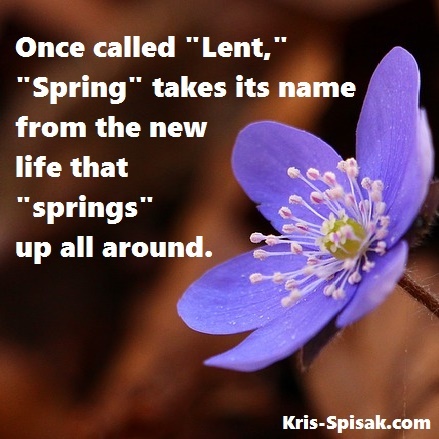

The season of rebirth has gone by many names, including “Lent” (according to the Church calendar) and “prime-temps” (based on the French printemps), but it was the “spring of the year,” that caught on in the 1500s.
New flowers spring from the earth; green leaves spring forth upon the trees; bugs spring at you when you take a walk through the grass…
No, wait. I don’t think that last one has anything to do with this etymology story. I think I’m just distracted by the year’s first mosquito bite. Sigh.
Join 500+ subscribers and sign-up for my monthly email newsletter for more trivia like this.
The post Trivia: The Origin of “Spring” appeared first on Kris Spisak.



